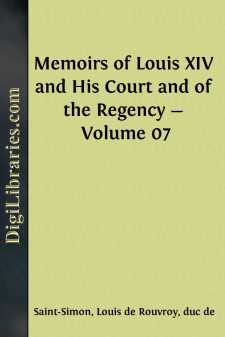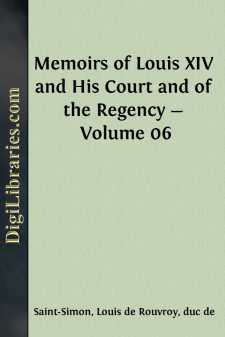Categories
- Antiques & Collectibles 13
- Architecture 36
- Art 48
- Bibles 22
- Biography & Autobiography 813
- Body, Mind & Spirit 142
- Business & Economics 28
- Children's Books 15
- Children's Fiction 12
- Computers 4
- Cooking 94
- Crafts & Hobbies 4
- Drama 346
- Education 46
- Family & Relationships 57
- Fiction 11828
- Games 19
- Gardening 17
- Health & Fitness 34
- History 1377
- House & Home 1
- Humor 147
- Juvenile Fiction 1873
- Juvenile Nonfiction 202
- Language Arts & Disciplines 88
- Law 16
- Literary Collections 686
- Literary Criticism 179
- Mathematics 13
- Medical 41
- Music 40
- Nature 179
- Non-Classifiable 1768
- Performing Arts 7
- Periodicals 1453
- Philosophy 64
- Photography 2
- Poetry 896
- Political Science 203
- Psychology 42
- Reference 154
- Religion 513
- Science 126
- Self-Help 84
- Social Science 81
- Sports & Recreation 34
- Study Aids 3
- Technology & Engineering 59
- Transportation 23
- Travel 463
- True Crime 29
Memoirs of Louis XIV and His Court and of the Regency - Volume 02
Description:
Excerpt
To return now to the date from which I started. On the 6th of August, 1695, Harlay, Arch-bishop of Paris, died of epilepsy at Conflans. He was a prelate of profound knowledge and ability, very amiable, and of most gallant manners. For some time past he had lost favour with the King and with Madame de Maintenon, for opposing the declaration of her marriage— of which marriage he had been one of the three witnesses. The clergy, who perceived his fall, and to whom envy is not unfamiliar, took pleasure in revenging themselves upon M. de Paris, for the domination, although gentle and kindly, he had exercised. Unaccustomed to this decay of his power, all the graces of his mind and body withered. He could find no resource but to shut himself up with his dear friend the Duchesse de Lesdiguieres, whom he saw every day of his life, either at her own house or at Conflans, where he had laid out a delicious garden, kept so strictly clean, that as the two walked, gardeners followed at a distance, and effaced their footprints with rakes. The vapours seized the Archbishop, and turned themselves into slight attacks of epilepsy. He felt this, but prohibited his servants to send for help, when they should see him attacked; and he was only too well obeyed. The Duchesse de Lesdiguieres never slept at Conflans, but she went there every afternoon, and was always alone with him. On the 6th of August, he passed the morning, as usual, until dinner-time; his steward came there to him, and found him in his cabinet, fallen back upon a sofa; he was dead. The celebrated Jesuit-Father Gaillard preached his funeral sermon, and carefully eluded pointing the moral of the event. The King and Madame de Maintenon were much relieved by the loss of M. de Paris. Various places he had held were at once distributed. His archbishopric and his nomination to the cardinalship required more discussion. The King learnt the news of the death of M. de Paris on the 6th. On the 8th, in going as usual to his cabinet, he went straight up to the Bishop of Orleans, led him to the Cardinals de Bouillon and de Fursternberg, and said to them:- "Gentlemen, I think you will thank me for giving you an associate like M. d'Orleans, to whom I give my nomination to the cardinalship." At this word the Bishop, who little expected such a scene, fell at the King's feet and embraced his knees. He was a man whose face spoke at once of the virtue and benignity he possessed. In youth he was so pious, that young and old were afraid to say afoul word in his presence. Although very rich, he appropriated scarcely any of his wealth to himself, but gave it away for good works. The modesty and the simplicity with which M. d'Orleans sustained his nomination, increased the universal esteem in which he was held.
The archbishopric of Paris was given to a brother of the Duc de Noailles- the Bishop of Chalons-sur-Marne—M. de Noailles thus reaping the fruit of his wise sacrifice to M. de Vendome, before related. M. de Chalons was of singular goodness and modesty. He did not wish for this preferment, and seeing from far the prospect of its being given to him, hastened to declare himself against the Jesuits, in the expectation that Pere la Chaise, who was of them, and who was always consulted upon these occasions, might oppose him. But it happened, perhaps for the first time, that Madame de Maintenon, who felt restrained by the Jesuits, did not consult Pere la Chaise, and the preferment was made without his knowledge, and without that of M. de Chalons. The affront was a violent one, and the Jesuits never forgave the new Archbishop: he was, however, so little anxious for the office, that it was only after repeated orders he could be made to accept it.
The Bishop of Langres also died about this time. He was a true gentleman, much liked, and called "the good Langres." There was nothing bad about him, except his manners; he was not made for a bishop—gambled very much, and staked high. M. de Vendome and others won largely at billiards of him, two or three times. He said no word, but, on returning to Langres, did nothing but practise billiards in secret for six months. When next in Paris, he was again asked to play, and his adversaries, who thought him as unskilful as before, expected an easy victory but, to their astonishment, he gained almost every game, won back much more than he had lost, and then laughed in the faces of his companions.
I paid about this time, my first journey to Marly, and a singular scene happened there. The King at dinner, setting aside his usual gravity, laughed and joked very much with Madame la Duchesse, eating olives with her in sport, and thereby causing her to drink more than usual—which he also pretended to do. Upon rising from the table the King, seeing the Princesse de Conti look extremely serious, said, dryly, that her gravity did not accommodate itself to their drunkenness. The Princess, piqued, allowed the King to pass without saying anything; and then, turning to Madame de Chatillon, said, in the midst of the noise, whilst everybody was washing his mouth, "that she would rather be grave than be a wine- sack" (alluding to some bouts a little prolonged that her sister had recently had).
The saying was heard by the Duchesse de Chartres, who replied, loud enough to be heard, in her slow and trembling voice, that she preferred to be a "winesack" rather than a "rag-sack" (sac d guenilles) by which she alluded to the Clermont and La Choin adventure I have related before.
This remark was so cruel that it met with no reply; it spread through Marly, and thence to Paris; and Madame la Duchesse, who had the art of writing witty songs, made one upon this theme. The Princesse de Conti was in despair, for she had not the same weapon at her disposal....












